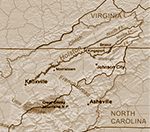 |
||||||||
|
||||||||
Martin Family |
||||||||
|
Joseph Martin, Jr. was born about 1740 in Albemarle County, Virginia. He was the was son of Captain Joseph Martin, Sr. and Susannah Chiles. The town of Martinsville, Virginia was named in his honor. He married Sarah Lucas in 1762 in Orange County, Virginia. Joseph's children may have included: John Martin (1762),
He attempted to settle in Powell's Valley in 1769, but was driven out by the Cherokee. In 1774, he was a lieutenant in Lord Dunmore's War.In 1775, he was a captain in the Virginia militia. That year he returned to Powell's Valley and built Martin's Station. It was the last fortified station along the Wilderness Road and was a well-known stop for the early settlers. While in Powell's Valley he married Elizabeth "Betsy" Ward. Elizabeth was the daughter of Nancy Ward. In 1776, following a Cherokee attack on the Fort Watauga settlement. After the attack, Joseph abandoned the station. In 1776 he was a captain on the Cherokee Expedition. In 1777, he was a member of the North Carolina constitutional convention and commanded troops at the Treaty of Long Island. That year Governor Patrick Henry appointed him as an Indian agent and he signed the petition of Holston men. He became a major in 1779 and lieutenant colonel in 1781. In 1782, Martin served in the North Carolina House of Commons. His wife, Sarah, died in 1782 at Scuffle Hill, their estate on the Smith River in Henry County, Virginia, In 1783, Joseph made a third attempt to settle in Powell's Valley. In 1784, Joseph married Susannah Graves, the daughter of William Graves. In 1783, 1786, 1787, and 1789 he served in the North Carolina Senate, representing Sullivan County. In 1787, the North Carolina assembly chose Martin as brigadier general for the Washington District. In 1789 , he sold his land in Powell Valley and the land near Kingsport, Tennessee. He returned to his plantation on Leatherwood Creek, near present day Martinsville in Henry County, Virginia. In 1795 and 1800-1802, he surveyed the border between Virginia and Tennessee. Joseph died at Belmont in Henry County, Virginia, in 1808.
|
|
||||||
|
||||||||
|
||||||||
|
©Roberta Tuller 2025
|
||||||||

